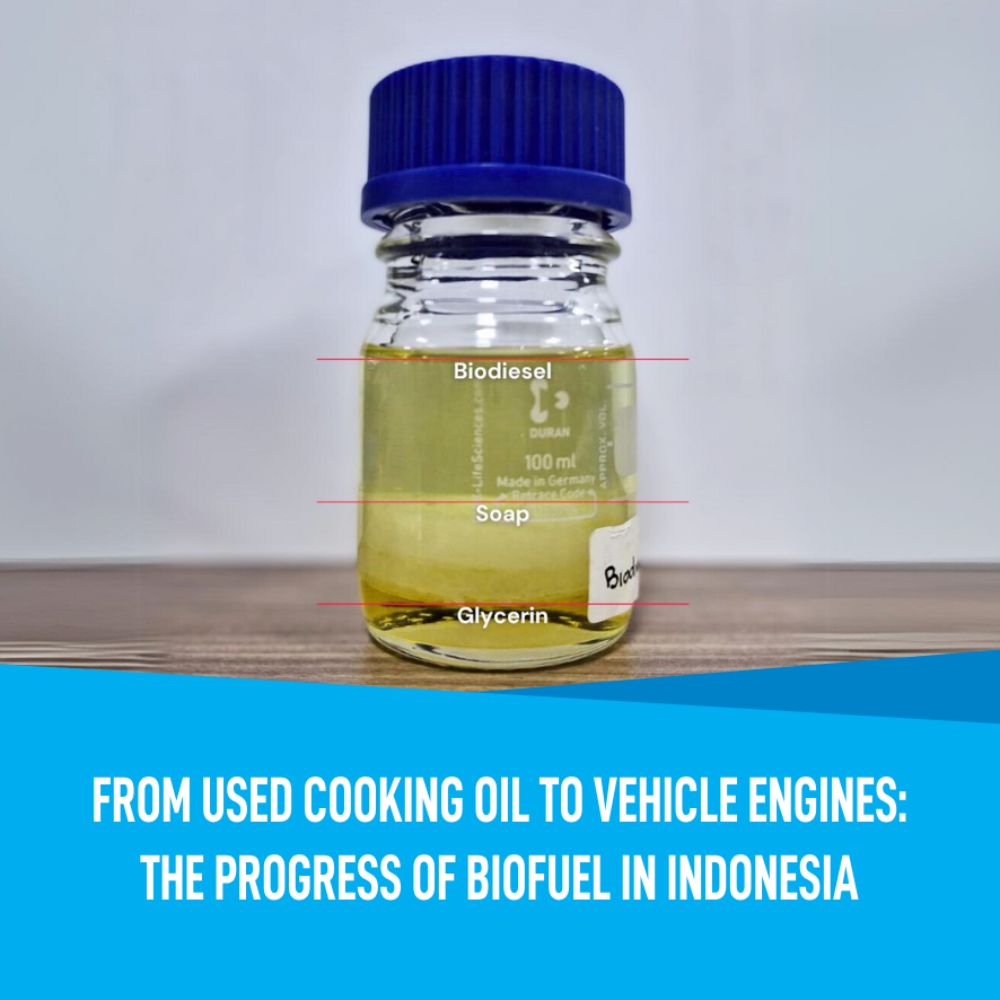
From Used Cooking Oil to Vehicle Engines: The Progress of Biofuel in Indonesia
The term “nabati” now extends beyond food products like wafers and cookies to include biofuels, especially B30, a type of plant-based fuel. Despite its growing importance, many people still don’t fully understand biofuels. Biofuels, made from plants or animals, offer a renewable and more eco-friendly alternative to fossil fuels. In Indonesia, biofuels are mostly available as biodiesel, a mix of biofuel and diesel sold at gas stations. B30, which contains 30% biofuel and 70% diesel, is part of a government plan to reduce reliance on fossil fuels. In 2023, 21 companies supplied 10.6 million kiloliters of biofuel, showing a rising demand for these sustainable fuels.
Development of Biofuel
In Indonesia, biofuel development aims to cut carbon emissions and lessen dependence on fossil fuels. Since 2016, biodiesel, made from sources like sugar, palm oil, or coconut oil, has been sold at gas stations. The target is to reduce greenhouse gas emissions by 29% by 2030. B30 plays a key role in this effort by reducing the use of petroleum fuels, lowering imports, and cutting emissions.
Despite some challenges, Indonesia has made significant progress in expanding the use of biofuels in transportation. Biofuels produce less carbon compared to fossil fuels, which helps reduce the overall carbon footprint of industry and transportation. This shift supports global climate goals and speeds up the move to cleaner energy. Indonesia’s future with B30 shows its commitment to sustainable energy. The country is focusing on improving production, using a variety of raw materials, and supporting research and innovation. As the biofuel industry grows, Indonesia aims to lead in solving energy and environmental issues while creating new economic opportunities.
Swiss German University’s Biofuel Innovation
Beyond using palm oil for biofuel, there are efforts to diversify sources. For instance, the Sustainable Energy Environment Department at Swiss German University (SGU) is working on a project to turn used cooking oil into biofuel. Silvya Yusri, a key person in the project, highlights that the large amount of waste cooking oil around the world, including in Indonesia, is often thrown away. This project aims to turn this waste into a useful energy source.
The process starts by mixing methanol and sodium hydroxide (NaOH) with the used cooking oil to speed up the chemical reaction. The mixture is heated and stirred for an hour at 60°C, then left to settle overnight in a tank. After settling, the mixture is separated into three layers: glycerin at the bottom, soap in the middle, and biodiesel on top. Silvya notes that the biodiesel from this process is not yet pure and needs further purification to meet Indonesian national standards (SNI). This purification involves removing water, filtering out impurities, and possibly more washing to ensure the biodiesel is ready for use.
SGU has also made progress in making biodiesel purification more eco-friendly. Traditional methods use water to remove glycerin, a byproduct of biodiesel production from crude palm oil, but this process wastes a lot of water and produces considerable waste. To solve this problem, Samuel Kusumocahyo, Rector of SGU, has developed ceramic membranes made from kaolin, a type of clay, to filter glycerin from biodiesel without using water. These membranes have very tiny pores that allow biodiesel to pass through while trapping glycerin, making the purification process more efficient and sustainable.
Additionally, the biofuel industry also faces issues with oxidation, especially with crude palm oil. As oil is used more, it becomes more prone to oxidation, which can spoil its taste and create an unpleasant odor. Oxidation can also lead to sediment that clogs fuel lines and damages engines.
To address this, Hery Sutanto, Dean of the Life Science and Engineering Faculty at SGU, has introduced antioxidant molecules into the biodiesel. These molecules help prevent oxidation, keeping the biodiesel stable and maintaining its quality over time. This innovation is important for ensuring biodiesel remains a reliable and eco-friendly alternative to traditional fuels.
Indonesia’s Development for a Sustainable Future
As Indonesia moves towards more sustainable energy, biofuel innovations continue to advance. With research and developments from institutions like SGU, the country is on track to lead in creating a more sustainable energy future. By focusing on biofuels, Indonesia is addressing environmental challenges and opening up new economic opportunities in the energy sector.
Contributor: Brand Champion 2023-2024
Kennera Micaella Pena – Global Strategic Communication 2023
Tentang SGU
SWISS GERMAN UNIVERSITY (SGU) is an international university in Indonesia, was established in 2000 as a joint effort between Indonesia, Germany, Switzerland, and Austria. We are the pioneer in offering international curricula in Indonesia. Qualified students can graduate with a Double Degree from Indonesia and Germany, which SGU provides in cooperation with partner universities; surely a valuable tool for your future careers. Ever since its establishment, SGU has been dedicated to delivering quality education in line with international standards and aims to develop skilled professionals who meet the demands of the industry. In order to achieve its objectives, SGU offers quality-oriented learning through 16 Bachelor’s Degree Programs and 6 Master’s Degree Programs ranging from Engineering, Information Technology, and Business to Life Sciences and Social Sciences. Furthermore, with small class sizes, and with English as the medium of instruction, you can look forward to pursuing your tertiary education and degree with full confidence.


